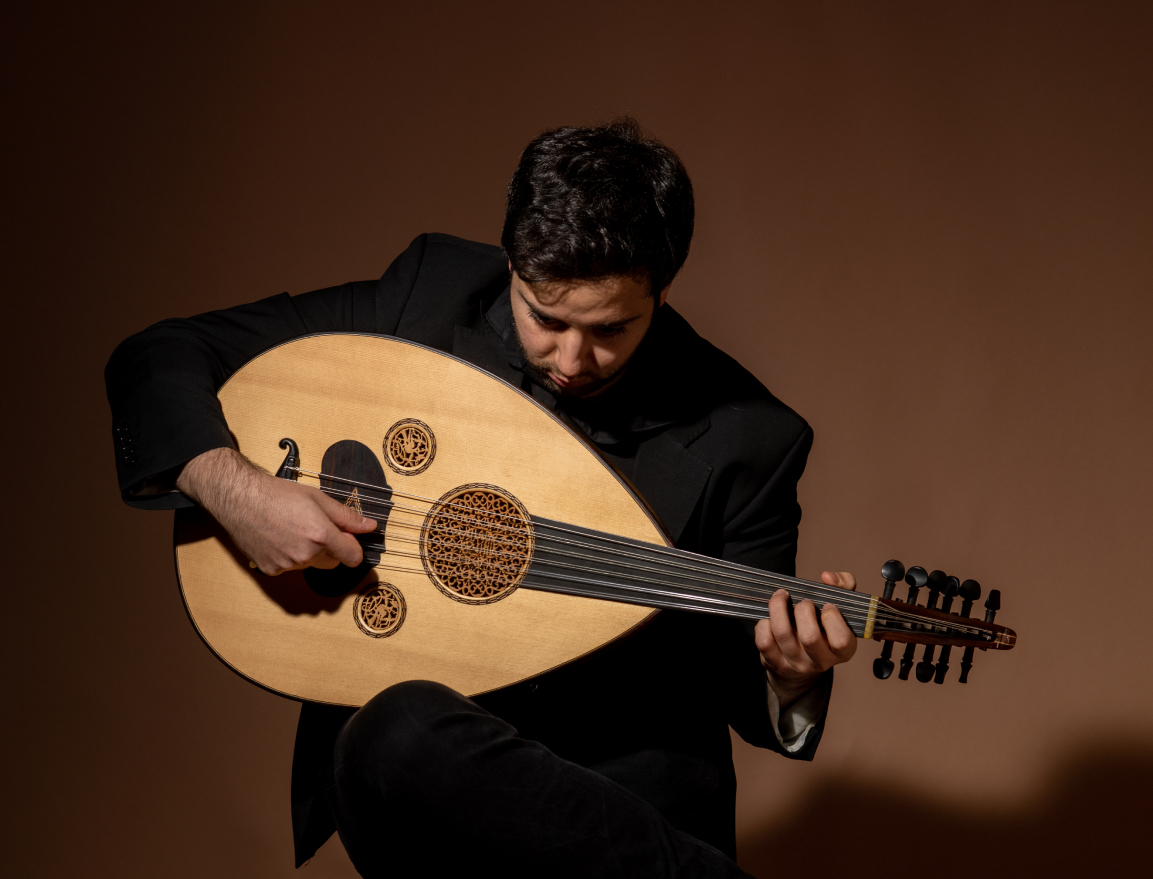Bakr Khleifi Oud
Program
Improvisation (Taqasim in Maqam Rast)
Zikrayati (Mohammad Al-Qasabji)
Abath (Bakr Khleifi)
Samai Shadaraban (Tanburi Cemil Bey)
Intermission
Rawafid Sakina (Bakr Khleifi)
Samai in Maqam Ushaq Masri (Bakr Khleifi)
Dancing Breeze (Bakr Khleifi)
Notes on the Pieces
Improvisation (Taqasim in Maqam Rast)
The program opens with a free improvisation (taqasim) in the maqam Rast, one of the foundational modes of Arabic music. With its calm, grounded character and balanced intervals, Rast sets a welcoming and introspective tone. The improvisation is unmetered and spontaneous, allowing the performer to shape the musical space and mood before we hear the first composed piece.
Zikrayati (Mohammad Al-Qasabji)
Known for his melodic writing and influence on early 20th-century Arabic music, Egyptian composer Mohammad Al-Qasabji (1892–1966) brings a balance of structure and expression to his work. This piece begins with a slow, lyrical section in a reflective mood, which leads into a short improvisation that gradually introduces rhythmic tension
Abath (Bakr Khleifi)
Abath—an Arabic word that can suggest “playfulness,” “futility,” or “disorder”—explores the balance between structure and freedom. The piece is built around a recurring main theme that functions like a rondo refrain, reappearing throughout in different forms. Between these returns, contrasting sections emerge—not fully composed, but shaped through improvisation around a melodic skeleton. Each return of the theme feels familiar yet changed, with transitions that blur the lines between composition and improvisation.
Samai Shad Araban (Tanburi Cemil Bey)
This classical Ottoman piece by Tanburi Cemil Bey (1873–1916) is a refined example of instrumental composition in Turkish music. The performance begins with an istihlal—a free, unmetered improvisation in the maqam Shadaraban. This opening is not only a way to set the mood, but also a traditional gesture of introduction, inviting the listener into the emotional and melodic world of the piece. The composed samai then unfolds in the traditional 10/8 Samai Thaqil rhythmic cycle, structured in a series of contrasting sections (khanat). In the final part, the rhythm shifts to 6/8, creating a graceful and flowing conclusion.
Rawafid Sakina (Bakr Khleifi)
Rawafid Sakina, meaning “Silent Streams,” is a meditative composition that draws on the peaceful character of the maqam Rahat al-Arwah—a mode whose name can be translated as “Sanctuary of Souls.” With its gentle contours and spiritual stillness, this maqam provides the tonal foundation for a piece centered on introspection and inner flow. The rhythm is Georgina—a graceful 10/8 cycle—which adds a subtle sense of movement. Through slowly unfolding phrases, the piece takes the listener into a reflective space where melody, rhythm, and silence are in delicate balance.
Samai in Maqam Ushaq Masri (Bakr Khleifi)
This original composition follows the classical samai form, reimagined through the lens of the maqam Ushaq Masri—a warm and expressive mode rooted in the Arabic tradition, particularly associated with Egypt. The piece moves through four composed sections (khanat), alternating with the recurring refrain (taslim), gradually unfolding the maqam’s lyrical and ornamental possibilities. While the first three khanat follow the traditional 10/8 Samai Thaqil rhythm, the final section ventures into the rarely used Khosh Rang rhythm—an asymmetrical 17/8 cycle. After this fourth khana, a short improvisation functions as a cadential moment that gently leads the listener back to the theme one final time.
Dancing Breeze (Bakr Khleifi)
Closing the program with a sense of joy and movement, Dancing Breeze is a lively composition in the maqam Ushaq Masri. Unlike the structured form of the preceding Samai, this piece flows more freely—playful, rhythmic, and dance-like.
The Artist

Bakr Khleifi
Oud
Bakr Khleifi was born in Jerusalem and received lessons from the renowned oud player Ahmad al-Khatib from the age of six. Over the following ten years, his teachers on the oud included Simon Shaheen and Samir Joubran. At the age of 15, he started learning the double bass, joining Daniel Barenboim’s West-Eastern Divan Orchestra just one year later. He subsequently studied world music with a focus on the oud at the University of Gothenburg and completed a master’s degree in double bass performance at the Buchmann-Mehta School of Music at Tel Aviv University. Performances as a double bassist and oud virtuoso have taken him across Europe, to his native Palestine, to North and South America, and to Asia. He was most recently heard at the Pierre Boulez Saal in 2024 in a duo with kamancheh player Misagh Joolaee and also served as a teacher and performer for the hall’s digital learning program on Arabic song.
April 2025